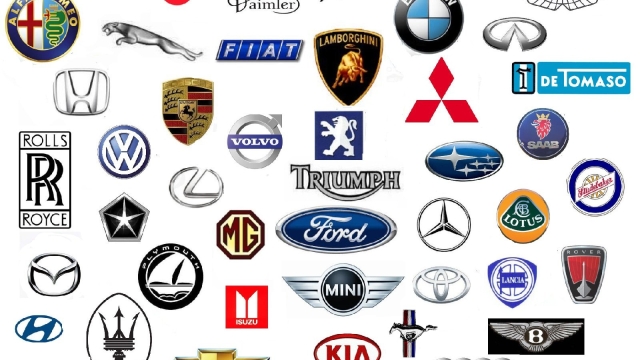As technology continues to advance at an unprecedented pace, it is undeniable that the automotive industry stands at the forefront of these advancements. Over the years, this dynamic sector has constantly evolved, embracing innovation and delivering cutting-edge vehicles that have revolutionized the way we live and move.

The automotive industry, often referred to as the backbone of modern transportation, is a vast and intricate ecosystem comprising manufacturers, suppliers, dealerships, and enthusiasts. It encompasses everything from the design and production of vehicles to their distribution and maintenance. This ever-expanding industry plays an integral role in shaping our daily lives and has a significant impact on both the global economy and individual mobility.
With the advent of electric vehicles (EVs), connected and autonomous technology, and the growing concern for sustainability, the automotive industry finds itself at a crucial turning point. The demand for electric and hybrid vehicles has surged in recent years, driven by concerns over climate change and a shift towards more eco-friendly mobility solutions. Simultaneously, the concept of self-driving cars is no longer confined to science fiction, as autonomous vehicles continue to undergo rigorous testing and development.
In this ever-evolving landscape, staying informed is more important than ever. With our comprehensive automotive industry guide, we aim to provide you with the latest information, insights, and trends shaping this transformative sector. From key players driving innovation to emerging technologies that promise to redefine the concept of transportation, this guide will serve as your go-to resource for all things automotive-related.
So fasten your seatbelt and join us as we explore the evolution of the automotive industry, a captivating journey that promises to reshape our transportation landscape and revolutionize the way we envision mobility.
1. The Rise of Electric Vehicles
The automotive industry has experienced a significant shift towards electric vehicles (EVs) in recent years. This transition is driven by the growing concern for the environment and the need to reduce greenhouse gas emissions. As a result, automakers around the world have been investing heavily in the development and production of electric cars.
One of the main advantages of electric vehicles is their eco-friendliness. Unlike traditional gasoline-powered cars, EVs run on electricity, which produces zero tailpipe emissions. This not only helps combat air pollution but also decreases our reliance on fossil fuels, making electric vehicles a more sustainable transportation option.
In addition to their environmental benefits, electric vehicles also offer improved energy efficiency. With advancements in battery technology, EVs are now capable of traveling longer distances on a single charge. This has alleviated one of the primary concerns for potential buyers — range anxiety. As charging infrastructure continues to expand globally, the practicality and convenience of owning an electric vehicle are further enhanced.
Moreover, the automotive industry has witnessed significant advancements in autonomous driving technology, further propelling the rise of electric vehicles. Many automakers are integrating advanced driver-assistance systems (ADAS) into their electric cars, paving the way for self-driving capabilities in the near future. This, coupled with the increasing affordability of EVs, has led to a growing interest among consumers and a higher adoption rate of electric vehicles worldwide.
The rise of electric vehicles in the automotive industry is clear evidence of its evolution towards a more sustainable and technologically advanced future. As electric cars become more attainable and the charging infrastructure continues to improve, we can expect a further surge in their popularity and a shift towards a greener transportation ecosystem.
Stanced Cars
2. Advanced Technologies in Automobiles
Advancements in technology have significantly impacted the automotive industry, revolutionizing the way we perceive cars. With each passing year, automotive manufacturers strive to incorporate cutting-edge technologies into their vehicles, enhancing safety, connectivity, and overall driving experience.
One of the remarkable technological advancements in the automotive industry is the successful integration of autonomous driving features. Self-driving cars, enabled by advanced sensors, cameras, and artificial intelligence algorithms, have the potential to transform our roads. These vehicles can analyze their surroundings, making informed decisions and taking control of the driving process. While still in its early stages, autonomous driving technology holds tremendous promise for the future, allowing for safer and more efficient transportation.
Another major development is the widespread adoption of electric vehicles (EVs). As concerns regarding climate change and environmental impact grow, the automotive industry has shifted its focus towards developing eco-friendly alternatives to traditional gasoline-powered cars. EVs, powered by batteries, produce zero tailpipe emissions, significantly reducing carbon footprints. Moreover, advancements in battery technology have led to increased range, faster charging times, and improved overall performance of electric vehicles, making them a viable option for consumers.
In recent years, automobiles have also seen remarkable advancements in terms of connectivity and digital integration. Modern cars are equipped with sophisticated infotainment systems, allowing for seamless integration with smartphones and other devices. This enables drivers and passengers to access a wide range of features, such as navigation, music streaming, hands-free calling, and real-time traffic updates. Furthermore, vehicles now come with advanced safety features, such as lane departure warning, adaptive cruise control, and automatic emergency braking, enhancing driver safety and reducing the risk of accidents.
As we look ahead, the automotive industry is set to continue evolving as new technologies emerge. From self-driving cars to electric vehicles and digital connectivity, the future of automobiles holds exciting possibilities. With each technological leap, the industry takes us closer to a safer, greener, and more connected future on the roads.
3. Shaping the Future: Trends and Innovations in the Automotive Industry
The automotive industry is continually evolving, driven by a range of trends and innovative technologies. This section explores some of the key transformations shaping the future of this industry.
Connected Cars: One of the most significant trends in the automotive industry is the rise of connected cars. These vehicles are equipped with advanced communication systems, allowing them to connect with other cars, infrastructure, and even smart devices. By enabling features such as real-time traffic updates, remote diagnostics, and over-the-air updates, connected cars enhance the overall driving experience while improving safety and efficiency.
Electric Vehicles (EVs): With the increasing global emphasis on reducing greenhouse gas emissions, electric vehicles have gained significant traction in recent years. EVs are powered by electric motors, eliminating the need for traditional fuel. Their popularity has soared due to advancements in battery technology, offering longer driving ranges and faster charging times. The widespread adoption of EVs is revolutionizing the automotive industry and contributing to a more sustainable future.
Autonomous Driving: The development of autonomous vehicles, also known as self-driving cars, is another major trend in the automotive industry. Autonomous driving technology utilizes a combination of sensors, cameras, and artificial intelligence to navigate and make decisions on the road. This innovation not only promises increased convenience and productivity but also has the potential to greatly reduce accidents caused by human error. However, the widespread deployment of fully autonomous vehicles still faces regulatory and safety challenges.
As the automotive industry continues to evolve, these trends and innovations will shape the future of mobility, transforming the way we travel and interact with vehicles. By embracing technological advancements and addressing regulatory hurdles, the industry is moving towards a more connected, electrified, and autonomous future.
Note: Remember to refer to the previous sections for a comprehensive guide and information on the automotive industry.


